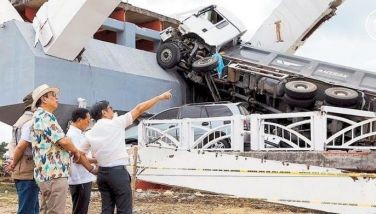No evidence of chicken smuggling found against Lucio Co
January 30, 2004 | 12:00am
Customs Commissioner Antonio Bernardo said yesterday that they have no evidence linking Chinese-Filipino businessman Lucio Co to the smuggling of 19 container vans full of chicken leg quarters through the Batangas City port last week.
Sen. Robert Barbers alleged during a Senate hearing yesterday that Co was behind the controversial release of the shipment, estimated at P50 million, last Jan. 23. "This Lucio Co is a notorious importer-smuggler," Barbers said, adding that he based his allegations on the information he received from Customs insiders.
The probe into the smuggling is part of the Senate’s efforts to find out what measures the government is taking to prevent the entry of bird flu, which is reported to be as deadly as Severe Acute Respiratory Syndrome (SARS).
Bernardo said Co’s name was not mentioned in the importation documents but investigators are looking into the trader’s possible involvement.
He said that so far, appropriate charges have been filed against nine Customs officials and employees assigned to the Batangas City port who were allegedly involved in the smuggling, and three private persons who handled the shipment.
Bernardo named Aguinaldo Marquez, chief of the assessment division; and Customs operations officers Ligaya Platon, Oscar Balicanta, Ofelia Suena, Oscar Boongaling, Epitacio Punzalan, Vic Arthur Limbaco, Rolando Roque, and Luisa Castillo.
Marquez, Platon, Boongaling and Castillo will be slapped with both administrative and criminal charges for smuggling, while the others face administrative charges for falsifying public documents, dishonesty and gross negligence. Bernardo said they form the first batch of 11 Customs officials and employees who will be charged criminally and administratively as the investigation continues on the smuggling.
Some of the vans, emptied of their contents, were found at the premises of the shipment’s consignee, Von Way Trading. The company’s owner, Ronaldo Laderas, his wife Raquel, and Ivy Sarad, the broker who facilitated the release of the shipment, will face criminal charges. Bernardo said further investigation will be conducted to uncover other Customs personnel who may have beeen involved in the alleged technical smuggling.
Bernardo said of the 19 refrigerated container vans, 12 were found empty and five were intercepted with their contents intact and impounded at the Batangas City port.
The remaining two vans were seized early yesterday morning at a checkpoint in Taguig, after the receipts presented by the drivers did not match the amount of chicken meat in the vans.
Superintendent Jose Gentilles, Southern Police District’s intelligence and investigation division chief, said Customs investigator Victor Tuazon informed police about the vans parked on a vacant lot in Hammerson Compound in Bagong Tanyag, Taguig.
Gentilles said checkpoints were put in place following Tuazon’s tip. The vans were seized and the drivers, identified as Antonio Lopez and Odelon Sorreda, held for questioning. A sketchy police report said the two drivers were supposed to deliver the chicken meat to Mekeni Food Company in Pampanga. Police transferred the seized vans and their contents to the Bureau of Customs.
Bernardo earlier said the shipment was misdeclared as dry goods and not covered by the necessary import permit from the Department of Agriculture.
According to documents, the shipment of chicken leg quarters was imported from Canada and packed in the United States. It was then shipped and unloaded at the Port of Batangas after passing through Taiwan, one of nine Asian countries affected by bird flu.
Meanwhile, health officials said that the bird flu virus spreading to many parts of Asia may be deadlier than the organism that causes SARS.
World Health Organization (WHO) country representative Dr. Jean Marc Olive told the Senate committee on agriculture and food, chaired by Sen. Ramon Magsaysay, that it is important that the government take necessary measures to prevent the entry of the disease into the country.
He said the flu "pandemic" in 1918, 1967 and 1997 showed that bird flu could be deadlier than SARS. "With the avian flu virus having spread in large portions of Asia’s poultry stock, there is a threat of importation of the virus into the Philippines. Such a wide spread of a highly aggressive avian virus has never been seen before," Olive said.
He noted that although previous bird flu outbreaks show that the disease was transmitted from live chickens to humans, "it will have many opportunities to alter its form and become transmissible between humans."
Olive said "best-case scenarios" suggest that a vaccine to protect human beings from the bird flu is "at least six or seven months" away. — With Edu Punay
Sen. Robert Barbers alleged during a Senate hearing yesterday that Co was behind the controversial release of the shipment, estimated at P50 million, last Jan. 23. "This Lucio Co is a notorious importer-smuggler," Barbers said, adding that he based his allegations on the information he received from Customs insiders.
The probe into the smuggling is part of the Senate’s efforts to find out what measures the government is taking to prevent the entry of bird flu, which is reported to be as deadly as Severe Acute Respiratory Syndrome (SARS).
Bernardo said Co’s name was not mentioned in the importation documents but investigators are looking into the trader’s possible involvement.
He said that so far, appropriate charges have been filed against nine Customs officials and employees assigned to the Batangas City port who were allegedly involved in the smuggling, and three private persons who handled the shipment.
Bernardo named Aguinaldo Marquez, chief of the assessment division; and Customs operations officers Ligaya Platon, Oscar Balicanta, Ofelia Suena, Oscar Boongaling, Epitacio Punzalan, Vic Arthur Limbaco, Rolando Roque, and Luisa Castillo.
Marquez, Platon, Boongaling and Castillo will be slapped with both administrative and criminal charges for smuggling, while the others face administrative charges for falsifying public documents, dishonesty and gross negligence. Bernardo said they form the first batch of 11 Customs officials and employees who will be charged criminally and administratively as the investigation continues on the smuggling.
Some of the vans, emptied of their contents, were found at the premises of the shipment’s consignee, Von Way Trading. The company’s owner, Ronaldo Laderas, his wife Raquel, and Ivy Sarad, the broker who facilitated the release of the shipment, will face criminal charges. Bernardo said further investigation will be conducted to uncover other Customs personnel who may have beeen involved in the alleged technical smuggling.
Bernardo said of the 19 refrigerated container vans, 12 were found empty and five were intercepted with their contents intact and impounded at the Batangas City port.
The remaining two vans were seized early yesterday morning at a checkpoint in Taguig, after the receipts presented by the drivers did not match the amount of chicken meat in the vans.
Superintendent Jose Gentilles, Southern Police District’s intelligence and investigation division chief, said Customs investigator Victor Tuazon informed police about the vans parked on a vacant lot in Hammerson Compound in Bagong Tanyag, Taguig.
Gentilles said checkpoints were put in place following Tuazon’s tip. The vans were seized and the drivers, identified as Antonio Lopez and Odelon Sorreda, held for questioning. A sketchy police report said the two drivers were supposed to deliver the chicken meat to Mekeni Food Company in Pampanga. Police transferred the seized vans and their contents to the Bureau of Customs.
Bernardo earlier said the shipment was misdeclared as dry goods and not covered by the necessary import permit from the Department of Agriculture.
According to documents, the shipment of chicken leg quarters was imported from Canada and packed in the United States. It was then shipped and unloaded at the Port of Batangas after passing through Taiwan, one of nine Asian countries affected by bird flu.
Meanwhile, health officials said that the bird flu virus spreading to many parts of Asia may be deadlier than the organism that causes SARS.
World Health Organization (WHO) country representative Dr. Jean Marc Olive told the Senate committee on agriculture and food, chaired by Sen. Ramon Magsaysay, that it is important that the government take necessary measures to prevent the entry of the disease into the country.
He said the flu "pandemic" in 1918, 1967 and 1997 showed that bird flu could be deadlier than SARS. "With the avian flu virus having spread in large portions of Asia’s poultry stock, there is a threat of importation of the virus into the Philippines. Such a wide spread of a highly aggressive avian virus has never been seen before," Olive said.
He noted that although previous bird flu outbreaks show that the disease was transmitted from live chickens to humans, "it will have many opportunities to alter its form and become transmissible between humans."
Olive said "best-case scenarios" suggest that a vaccine to protect human beings from the bird flu is "at least six or seven months" away. — With Edu Punay
BrandSpace Articles
<
>
- Latest
- Trending
Trending
Latest
Trending
Latest
Recommended




























